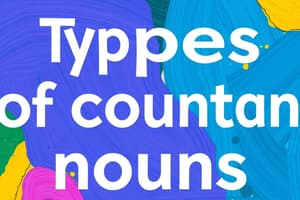Podcast
Questions and Answers
Which type of noun does not have a specific number or separate identities?
Which type of noun does not have a specific number or separate identities?
- Plural nouns
- Singular nouns
- Countable nouns
- Uncountable nouns (correct)
What is the function of quantifiers in a sentence?
What is the function of quantifiers in a sentence?
- To describe the noun's adjective
- To describe the noun's verb
- To describe the noun's tense
- To describe the quantity or amount of a noun (correct)
Which of the following is an example of a countable noun?
Which of the following is an example of a countable noun?
- I need more coffee
- I need more food
- I need more books (correct)
- I need more air
Which article is used with countable nouns to specify which one of a category you are referring to?
Which article is used with countable nouns to specify which one of a category you are referring to?
What is a common mistake learners make when using countable and uncountable nouns?
What is a common mistake learners make when using countable and uncountable nouns?
Which of the following is an example of an uncountable noun?
Which of the following is an example of an uncountable noun?
What is the function of the definite article 'the' in a sentence?
What is the function of the definite article 'the' in a sentence?
Why do uncountable nouns not use articles?
Why do uncountable nouns not use articles?
Which of the following is an example of a correct usage of an article with a countable noun?
Which of the following is an example of a correct usage of an article with a countable noun?
What is a characteristic of uncountable nouns?
What is a characteristic of uncountable nouns?
Flashcards are hidden until you start studying
Study Notes
Countable and Uncountable Nouns: A Detailed Guide
Countable and uncountable nouns are two categories of nouns in English grammar. Uncountable nouns define abstract qualities, materials, liquids, collections, and conceptual things without separate identities or boundaries. Countable nouns, on the other hand, are things we can count and have a specific number, such as articles or pets.
Quantifiers
Quantifiers are words that describe the quantity or quantity of a noun. Examples include "some," "any," "every," "many," and "most." Uncountable nouns do not go with numbers, and rarely with plural forms or articles. For example:
- Uncountable: "I need more coffee."
- Countable: "I need more books" (in this case, "books" is a countable noun as it can be counted).
Article Usage
Articles are used with countable nouns to specify which one of a category you are referring to. There are two types of articles: definite (the) and indefinite (a/an). Uncountable nouns do not use articles. For example:
- Countable: "I need a book."
- Uncountable: "I need food."
Common Noun Mistakes
Learners often make mistakes when using countable and uncountable nouns. Here are some common mistakes:
- Using the wrong article: Uncountable nouns do not use articles. For example: "I need some coffee."
- Using the wrong plural form: Uncountable nouns do not have a plural form. For example: "I need some advices."
- Using the wrong preposition: With uncountable nouns, you cannot use prepositions like "of" or "in." For example: "I need some advice on."
- Using the wrong quantifier: Uncountable nouns cannot be measured in numbers. For example: "I need two advices."
Practice and Resources
To improve your understanding and usage of countable and uncountable nouns, you can practice with quizzes and exercises. The OWL handout with quiz links () and the LearnEnglish British Council website () offer resources for practicing count and uncount nouns.
Studying That Suits You
Use AI to generate personalized quizzes and flashcards to suit your learning preferences.




